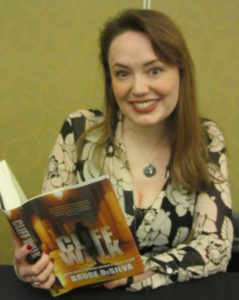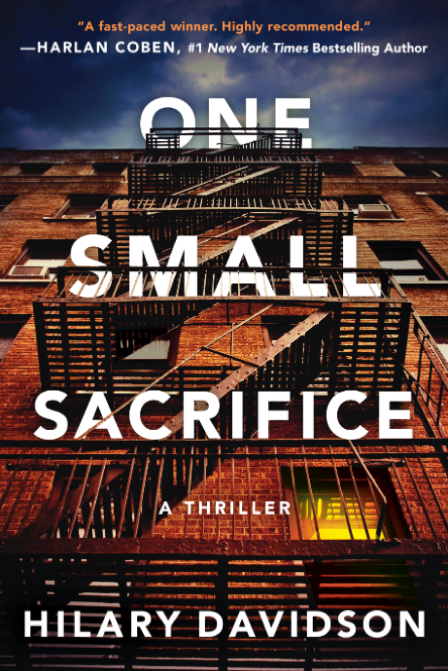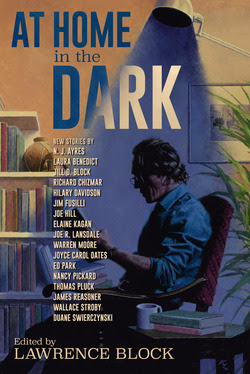 After a solid apprenticeship as a travel writer and journalist, Hilary Davidson has emerged as an accomplished fictioneer, winning awards for her novels (The Damage Done) and short stories (The Black Widow Club) . She was born in Canada, and when our paths crossed in 2011 at a very enjoyable mystery conference in Quebec City, she’d already been a New Yorker for a decade. Her newest novel, One Small Sacrifice, has a full complement of raves well in advance of publication; Harlan Coben calls it her best work yet, and Megan Abbott says: “Twisty, absorbing, and deeply humane, it’s a thriller you won’t want to miss.”
After a solid apprenticeship as a travel writer and journalist, Hilary Davidson has emerged as an accomplished fictioneer, winning awards for her novels (The Damage Done) and short stories (The Black Widow Club) . She was born in Canada, and when our paths crossed in 2011 at a very enjoyable mystery conference in Quebec City, she’d already been a New Yorker for a decade. Her newest novel, One Small Sacrifice, has a full complement of raves well in advance of publication; Harlan Coben calls it her best work yet, and Megan Abbott says: “Twisty, absorbing, and deeply humane, it’s a thriller you won’t want to miss.”
You’ll note that Hilary is shown here pretending to read a novel by Bruce DeSilva. You’ll note, too, that one Frank DeSilva is a principal character in Hilary’s story. I’m sure there’s no connection.
COLD COMFORT by Hilary Davidson
The artists at the Humphrey Funeral Home were miracle workers, but even they couldn’t piece Abby Killingsworth’s face back together. In life, she had a curious charisma that was immediately striking in spite of her flaws. It was powerful yet puzzling: her eyes were wide-set and her nose had a bump and her lips were so plump and ripe that they lent her a faintly cartoonish appearance. Yet, when observed together in their heart-shaped frame, a peculiar alchemy occurred that could render complete strangers mute.
Abby had been a great beauty in life. In death, she was a broken statue, mere fragments of cold marble. My own heart had cracked in sadness when I first laid eyes on her lifeless body. In the oasis of false comfort that was the Humphrey Funeral Home, with its piped-in violin music, I kept up my unperturbed façade by imagining that Abby was elsewhere.
“The casket will stay closed,” her mother announced. It was the day before Abby’s funeral, and we stood together in a viewing room at the Humphrey. It was preposterously grand, with a domed ceiling that spoke of aspirations to royal chapelhood. Janet Killingsworth had asked me to accompany her to provide moral support, since her husband had refused to leave the house since his daughter’s death. “I don’t want anyone seeing what that bastard did to her.” She bit her lip. “I’m sorry, Father, I didn’t mean to swear.”
“Please don’t worry about that.” I struggled to come up with something meaningful to say, anything that could blunt the pain. “Abby is at peace now, you must concentrate on that.”
“Oh, Father, I try to. But when I think of what that monster did to my baby…” Janet’s voice cracked. I put my hand on her shoulder, and she rested her head on my chest.
“Why would God take my baby?” Janet sobbed.
Of all the questions asked of me since I’d joined the priesthood, this was the most perplexing. I had no answers, only the same platitudes I’d heard since I was a boy growing up in County Cork. “All I can promise is that there is meaning in everything. It is invisible to us, so we must trust the Lord in all things.”
 Janet inhaled sharply and shuddered. “There’s one other thing,” she said, pulling away. “I want you to perform an Absolution for Abby.”
Janet inhaled sharply and shuddered. “There’s one other thing,” she said, pulling away. “I want you to perform an Absolution for Abby.”
I stared at her. Absolution had been removed from the Funeral Mass before I was born. I’d only performed it a handful of times, in unusual circumstances.
“My daughter may have been… involved with a man,” Janet said quietly.
“What?”
Janet read the shock in my face, and quickly added. “Abby was such a good girl, and I don’t know if it really counts as an affair, because she was separated from her husband, but…”
“Why would you suspect such a thing?”
Janet wiped her eyes. “Abby was pregnant.”
“What? Abby told you that?”
“No, Father. The police did. It came up in the autopsy.” She choked on that last word.
“The child might’ve been her husband’s,” I pointed out.
“No. Abby didn’t see Frank at all. She told me she didn’t.” Janet gazed at me. “What did Abby say to you?”
“It wasn’t anything she said outright,” I explained. “It was her attitude. Whenever I visited her in the past few weeks, she was in a much more forgiving frame of mind about Frank. She believed he was capable of change, I think.” I was silent for a moment. “I saw vases of daisies in her suite a couple of times. I suppose I simply assumed that they were from Frank. That was the flower they used at their wedding.”
“She seemed so happy, before she died,” Janet said softly. “Glowing. Almost as if she were in love. That wasn’t because of Frank. She didn’t love him anymore. A mother knows these things.”
“You haven’t said anything about this, have you?” I asked. “It’s not anyone’s business, but of course people might wonder…”
“No. I don’t want her good name ruined. There are people who might think what that bastard—her husband, I mean—did to her was justified.”
“No one would ever think that.”
“Some people are cruel, Father. Abby was a good girl, but she… she had her flaws.”
“We all do,” I told her, speaking softly but with a firmness I hoped would comfort her. “We are all flawed creatures, yet the Lord loves us nonetheless.”
#
The visitation started at three that afternoon. I stayed for the first two hours, offering comfort when I could. Abby had been an only child, but she had relatives on three continents, so her parents planned two days of visitation before her funeral to allow everyone to arrive in time. I left at five o’clock, stopping by my office at the church, as it was only six blocks from the funeral home. To my surprise, my secretary, Millie Tamliss, was still at her desk. She was seventy-two years old, with white hair and faded blue eyes. Her bones were only slightly larger than a sparrow’s, and she seemed to live on air. In the years since I’d come to the parish, I’d never observed her eating or drinking.
“Good evening, Father. How was it?”
“Very sad. So many people came by to pay their respects. No one can quite believe it.”
“I still can’t, myself. Poor girl. It’s heartbreaking.” She clicked open her black patent purse, extracted a tissue, and blew her nose. “Just so you know, Father, there’s something wrong with the phone line. It’s been ringing off the hook for the past hour, but no one’s there when I answer.”
“Technology. Never reliable when you need it to be.” I resisted the urge to glance at my watch. Mildred normally left the office by four, or four-thirty at the latest. Whoever was calling wasn’t expecting her to answer. “Thank you for staying so late. You didn’t have to do that.”
“I thought it would be best. On account of the gentleman.”
“What gentleman?”
“He’s in your office.”
I glanced at my door, which was closed all but an inch. My stomach churned slightly. Before I could ask her anything else, Mildred was up on her spindly legs. “I’m off to pay my respects to the Killingsworths,” she announced. “Good night, Father.”
“Good night,” I murmured, and turned to my office. It was six steps from Mildred’s desk. When I opened the door, I found a tall man in a suit studying my bookcase. His head swiveled in my direction. His thin face was narrowed to such a sharp point, it looked as if it had once been caught in a door.
“Good evening, Father Byrne,” he said. “I’m Detective Reed. We talked on the phone a couple times.”
“Yes, of course,” I said, recognizing his voice. “Have you brought Frank DeSilva into custody?”
Frank was Abby’s estranged husband, the man who went to the small hotel where Abby was renting a room and beat her to death. There had never been any doubt about who had murdered Abby. Frank was on camera entering the hotel, then departing with blood on his weathered hands and white shirt.
 Reed shook his head. “He’s still in the wind. I need to ask you a few more questions.”
Reed shook his head. “He’s still in the wind. I need to ask you a few more questions.”
He was alone, which surprised me. I’d thought police officers did everything in pairs, like creatures bound for Noah’s Ark.
“Of course. Would you care for some tea?”
“No, thanks.
I sat at my desk, surreptitiously checking to see if anything had been moved. The screen of my computer was on, which meant he’d touched it, though it was stuck on the password screen. “How can I help you?” I asked.
Reed stayed on his feet. “We’re having trouble getting a bead on Frank DeSilva. His parents are dead, and he’s got no family in the area.”
“I’m sorry, but I don’t know his friends.”
“That’s okay. I’d like you to tell me about Abby’s relationship with her husband.”
“I’m the priest who married them.” I took a breath. “I’ve known Abby since I came to this parish seven years ago. She was a teenager then, fifteen or sixteen. Frank, I only met two years ago, when they became engaged and came to me for pre-marital counselling.” I stared at my hands. “I didn’t know that he was abusive towards her, not back then. I’m not even sure that he was abusive at that time. From what Abby told me, he started beating her after they came home from their honeymoon.” I frowned, remembering exactly what Abby had told me about it. “There was a sporting event on television, a rugby match or something like it. Frank wanted to watch it and Abby had promised they would have dinner with her parents. That was the first time he hit her.”
“Football,” the detective corrected me. “It was football.”
COLD COMFORT by Hilary Davidson is one of 17 outstanding stories in At Home in the Dark. I think it’s worth noting that Hilary tweeted the following just hours ago: “If you love an author’s work & want to support it, pre-order their book. It makes such a huge difference.” I’d say that applies in full measure to One Small Sacrifice (available right now at a remarkably low pre-order price)…and, come to think of it, to this game-changing anthology. NB: Ebook and paperback editions are on sale now for immediate delivery. DON’T try to order the hardcover, as it’s sold out at the publisher, and while Amazon is still taking orders they’ll be unable to deliver.
